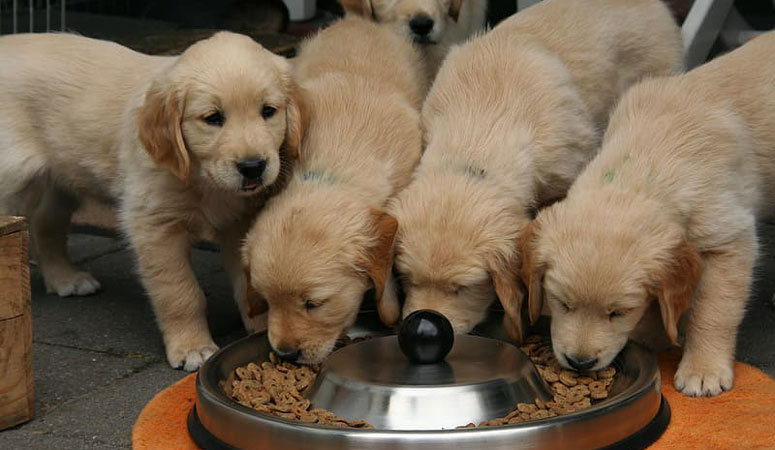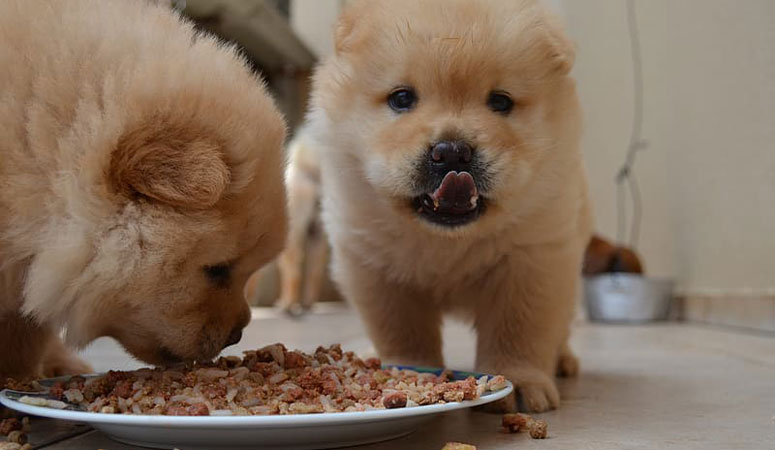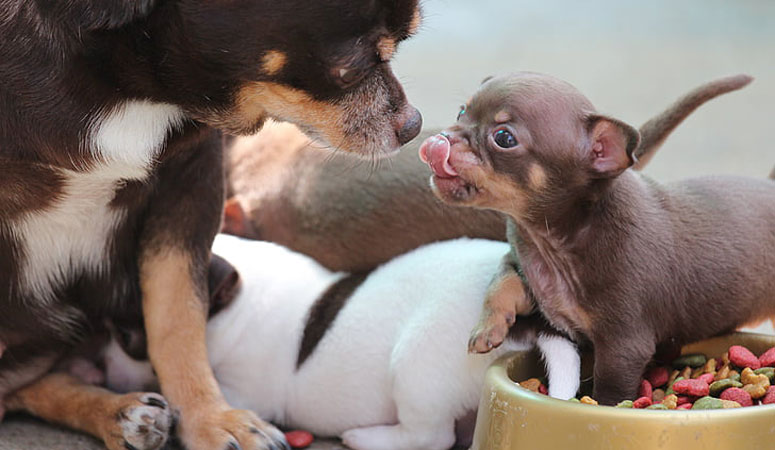What Should We Feed Our Puppies?
When you spend a couple of hours around any puppy, you quickly learn a few things about them. Puppies are cute, funny, clumsy, full-on, or fast asleep. And they love to eat!
Puppies eat a lot because they need enough nutrition to support their fast growing.
Puppies will double their weight in the first week after birth. After this, you can expect your pup to gain about 5 ounces per week for small breeds and 2.5 pounds a week for large breeds.

How Often Do We Feed Our Puppies?
After bringing your puppy home (usually at around 8–10 weeks), you will need to feed them 3–4 times per day, until they are about six months old. Around that time, you can think about switching to 2-3 meals a day.
How Much Food Should We Feed Our Pups?
A lot of pups don’t have an off switch when it comes to mealtime. They will guzzle down whatever is put in front of them because they might be used to fighting for their share of food with their littermates. Or they haven’t yet learnt to trust that their human will provide them with regular meals.
From birth until they are about six months old, your pup will need to eat two to four times as much as an adult dog to support their growth.
But overfeeding them can be dangerous, particularly for large and giant breeds where growth acceleration can lead to growth-related problems, particularly with their bones and front limbs.
Following the instructions on the bag of puppy food is a great place to start when working out how much food to give them.
- Remember to divide the total recommended amount of food per day by the number of meals you are feeding them.
- If you can, use a proper measure, like a cup, rather than guesswork.
Regardless of your pup’s size and breed, a good way of telling whether they are getting enough food – but not too much – is if you can feel but not see their ribs. They should also have a visible waist when you look down at them.

What Is the Best Food for Puppies?
When you first bring home your puppy, it is best to try and keep them on the same food that they are used to eating.
Quickly changing their diet, on top of the stress of moving to a new environment can cause bad digestive problems such as vomiting, diarrhea and dehydration, and make the toilet training process much harder.
If you want to substitute another food, going slowly with the transition (around 7 days or even longer depending on how your pup responds) will reduce the risk of gastrointestinal upset.
You can read our guide on how best to transition your pup’s food here:
Puppy food is generally higher in protein than adult dog food and should be enriched with vitamins, minerals, and the right fats that are essential for growth. It must provide them with plenty of energy, plenty of protein and a correct ratio of lime and phosphorus.

It is easiest to make sure your puppy gets all the nutrition they need, without any nasty stuff that can cause them health problems later in life by looking for good quality commercial products that:
- are specifically formulated of puppies (adult dog food does not contain enough nutrients for puppies)
- are enhanced with vitamins, minerals, natural prebiotics, amino acids and even superfoods
- use premium ingredients that are not genetically modified
- are free from artificial flavors, colors, and preservatives.
If you can find it, it is also good to look for food that is formulated for different sized pups. For example:
- a good large-breed puppy formula will help bigger pups grow at a rate gradual enough that they have time to develop strong bones and joints
- small-breed formulas will provide concentrated nutrition in a size that can easily be eaten in smaller mouths and meets the higher metabolic needs of small pups.
There aren’t any hard rules about the best time for every dog to switch from puppy food to adult dog food. But you should avoid the temptation of switching to an adult formula too early.
Generally, small, and medium-breed puppies should be fed a good quality puppy or all-life stages formula until 12 months of age. While your large – or giant-breed puppy will need to keep eating food that is specifically designed for large-breed puppies until they are 12–18 months old.

Other Things to Watch out for When Feeding Puppies
- Make sure your pup always has access to fresh water.
- Puppies should be fed at the same times every day as this creates a sense of security.
- Let your pup rest after eating and before taking it for walks or a play in the yard.
- Once your pup has been spayed or neutered, the calories they need to consume each day will reduce slightly. But keep them on puppy food if they are less than 12 months old.
- Never feed your puppy from the table, or you will be setting up a lifetime of begging behavior.
- Monitor your pup to make sure they aren’t eating things they shouldn’t, including stuffing and squeakers from the toy they might have just destroyed.
- Avoid feeding anything to your pup that is on our list of toxic and dangerous foods (which you can find here: What Food Should We Give Our Dogs).

